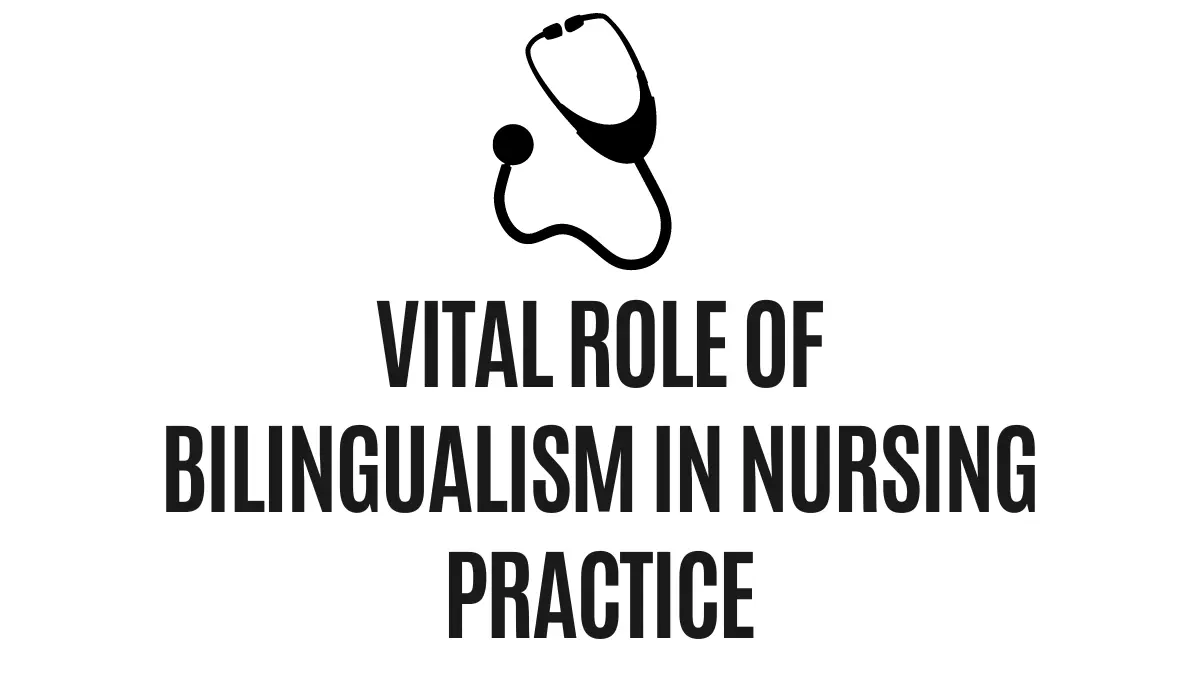In today’s multicultural society, healthcare professionals face the challenge of effectively communicating with patients from diverse linguistic backgrounds. Nurses, being at the forefront of patient care, often encounter language barriers that can impede treatment outcomes and patient satisfaction. However, bilingualism presents a valuable solution to bridge this gap, offering numerous benefits to both patients and healthcare providers alike. In this comprehensive guide, we delve into the significance of bilingualism in nursing practice, exploring its advantages and implications for patient care.
Understanding Bilingualism in Nursing Practice
Bilingualism Defined Bilingualism refers to the ability to speak and understand two languages proficiently. In nursing practice, bilingual nurses possess the crucial skill of communicating with patients in their preferred language, ensuring effective comprehension and expression of healthcare information.
The Growing Need for Bilingual Nurses With globalization and increased migration, healthcare settings are becoming increasingly diverse. According to recent statistics, the United States alone is home to a vast immigrant population, comprising individuals with varying linguistic backgrounds. As such, the demand for bilingual nurses has surged, reflecting the necessity for culturally competent care delivery.
Table: Benefits of Bilingualism in Nursing Practice
| Benefits | Description |
|---|---|
| Enhanced Patient Communication | Bilingual nurses facilitate clear and accurate communication between patients and healthcare providers, overcoming language barriers. |
| Improved Patient Outcomes | Patients receiving care in their native language exhibit greater satisfaction levels and adherence to treatment, resulting in improved health outcomes. |
| Cultural Competence | Bilingual nurses bring cultural sensitivity and understanding to patient care, promoting culturally competent and patient-centered healthcare delivery. |
| Increased Access to Services | By providing care in multiple languages, bilingual nurses expand access to healthcare services, particularly in underserved and diverse communities. |
The Benefits of Bilingualism in Nursing Practice
Enhanced Patient Communication Effective communication lies at the heart of quality healthcare delivery. For patients with limited English proficiency (LEP), language barriers can hinder their ability to convey symptoms, understand treatment plans, and adhere to medical instructions. Bilingual nurses serve as invaluable intermediaries, facilitating clear and accurate communication between patients and healthcare providers.
Improved Patient Outcomes By breaking down language barriers, bilingual nurses contribute to improved patient outcomes. Studies have shown that patients who receive care in their native language exhibit greater satisfaction levels and are more likely to adhere to treatment regimens. Additionally, bilingualism fosters trust and rapport between patients and caregivers, resulting in enhanced patient engagement and compliance.
Cultural Competence and Sensitivity Beyond language proficiency, bilingual nurses bring cultural competence and sensitivity to their practice. Understanding cultural nuances and customs enables nurses to deliver patient-centered care that respects individual beliefs and values. By embracing diversity, healthcare providers can foster a welcoming and inclusive environment conducive to optimal patient outcomes.
Increased Access to Healthcare Services In underserved communities, language barriers often exacerbate existing disparities in healthcare access and utilization. Bilingual nurses play a pivotal role in addressing these disparities by bridging linguistic divides and expanding access to healthcare services. By providing care in multiple languages, nurses contribute to equitable healthcare delivery and promote health equity among diverse populations.
The Impact of Bilingualism on Nursing Practice: A Case Study
To illustrate the tangible benefits of bilingualism in nursing practice, let’s consider a real-life scenario:
Case Study: Maria Rodriguez, Bilingual Nurse Maria Rodriguez, a bilingual nurse working in a bustling urban hospital, encounters a Spanish-speaking patient, Mr. Martinez, in the emergency department. Despite experiencing severe chest pain, Mr. Martinez struggles to articulate his symptoms in English, leading to communication breakdowns with the healthcare team. Recognizing the importance of clear communication, Maria steps in to assist, seamlessly translating between Mr. Martinez and the medical staff. Through her linguistic proficiency and cultural understanding, Maria ensures that Mr. Martinez receives timely and appropriate medical care, ultimately leading to a positive treatment outcome.
Conclusion
In conclusion, bilingualism is a vital asset in nursing practice, offering myriad benefits that extend beyond language proficiency. Bilingual nurses play a pivotal role in enhancing patient communication, improving outcomes, promoting cultural competence, and increasing access to healthcare services. As healthcare continues to evolve in an increasingly diverse society, the demand for bilingual nurses will only continue to grow. By recognizing the value of linguistic diversity and investing in bilingual education and training, healthcare organizations can foster a more inclusive and effective care environment for all patients.

